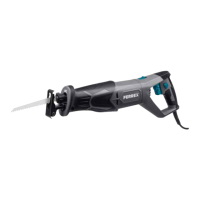Safety
7
Electrical safety
a) Power tool plugs must match the outlet. Never modify the plug in
any way. Do not use any adapter plugs with earthed (grounded)
power tools.
Unmodified plugs and matching outlets will reduce risk
of electric shock.
b) Avoid body contact with earthed or grounded surfaces, such as
pipes, radiators, ranges and refrigerators.
There is an increased
risk of electric shock if your body is earthed or grounded.
c) Do not expose power tools to rain or wet conditions.
Water
entering a power tool will increase the risk of electric shock.
d) Do not use the cord for improper purposes such as for carrying
the power tool, for hanging it up or for pulling or unplugging
it from the socket. Keep cord away from heat, oil, sharp edges
and moving parts.
Damaged or entangled cords increase the risk of
electric shock.
e) When operating a power tool outdoors, use only extension cords
that are suitable for outdoor use.
Use of a cord suitable for outdoor
use reduces the risk of electric shock.
f) If operating a power tool in a damp location is unavoidable, use
a residual current device (RCD) protected supply.
Use of an RCD
reduces the risk of electric shock.
Personal safety
a) Stay alert, watch what you are doing and use common sense
when operating a power tool. Do not use a power tool while you
are tired or under the influence of drugs, alcohol or medication.
A moment of inattention while operating power tools may result in
serious personal injury.
b) Use personal protective equipment. Always wear eye protection.
Protective equipment such as dust mask, non-skid safety shoes, hard
hat, or hearing protection used for appropriate conditions will reduce
personal injuries.
c) Prevent unintentional starting. Make sure that the power tool is
turned off before you connect it to the power supply, pick it up
or carry it.
Carrying power tools with your finger on the switch or
connecting the power tool to a power supply while the switch is set to
‘on’ may lead to accidents.

